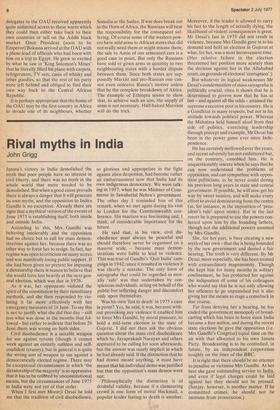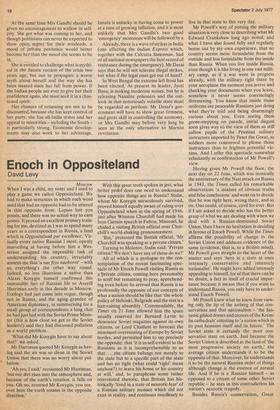. Rival myths in India
John Grigg
Janata's victory in India demolished the myth that poor people have no interest in civil liberty, and there was no myth in the whole world that more needed to be demolished. But when a good cause prevails there is always a danger that it will generate its own myths, and the opposition to Indira Gandhi is no exception. Already there are signs that a mythical version of the events of June 1975 is establishing itself, both inside and outside India.
According to this, Mrs Gandhi was behaving intolerably and the opposition had no choice but to call for mass demon- strations against her, because there was no other way to force her to resign. In fact, her regime was open to'criticism on many scores and was manifestly losing public support. If she had been given no pretext for imposing a dictatorship there is reason to believe that she would have lost heavily at the next gen- eral election, which was due in 1976.
As it was, her opponents violated the spirit of the constitution by their tumultuary methods, and she then responded by vio- lating it far more effectively with her emergency measures of 26 June. To say this is not to justify what she did that day — still less what was done in the months that fol- lowe,d — but rather to indicate that before 26 June there was wrong on both sides.
Civil disobedience is a suitable weapon for use against tyrants (though it cannot work against an entirely ruthless and self- confident tyranny), but in general it is quite the wrong sort of weapon to use against a democratically elected regime. There may be exceptional circumstances in which 'the dictatorship of the majority' is so oppressive that it has to be masted by unconstitutional means, but the circumstances of June 1975 in India were not yet of that order.
When I first met Morarji Desai he told me that the tradition of civil disobedience, so glorious and "appropriate in the fight against alien despotism, had become rather an embarrassment now that India had its own indigenous democracy. We were talk- ing in 1957, when he was Minister of Com- merce in Jawaharlal Nehru's government. The other day I reminded him of this remark, when we met again during his visit to London for the Commonwealth con- ference. His reaction was fascinating and, I think, of considerable importance for the future.
He said that, in his view, civil dis- obedience must always be peaceful and should therefore never be organised on a massive scale, — because mass demon- strations were liable to lead to violence. This was true of Gandhi's 'Quit India' cam- paign in 1942; since it resulted in violence it was clearly a mistake. The only form of satyagraha that could be regarded as mor- ally 'safe' was that undertaken by con- spicuous individuals, acting on behalf of the public but inflicting danger and discomfort only upon themselves.
Was his own 'fast to death' in 1975 a case in point? Yes, he said, it was, because with- out provoking any violence it enabled him to force Mrs Gandhi, by moral pressure, to hold a mid-term election in the state of Gujerat. I did not then ask the obvious question about the mass civil disobedience which he, Jayaprakash Narayan and others appeared to be calling for soon afterwards, but the answer was surely implicit in which he had already said. If the distinction that he had drawn meant anything, it must have meant that his individual demo was justified but that the opposition's mass demos were not.
Philosophically the distinction is of doubtful validity, because if a clamouring crowd is one form of moral blackmail, a popular leader fasting to death is another. Moreover, if the leader is allowed to carry his fast to the length of actually dying, the likelihood of violent consequences is great. Mr Desai's fast in 1975 did not result in violence, because Mrs Gandhi gave in to his demand and held an election in Gujerat at what, for her, was a most inconvenient time. (Her relative failure in the election threatened her position more acutely than the decision against her in the Allahabad court, on grounds of electoral `corruption'.) But whatever its logical weaknesses Mr Desai's condemnation of mass satyagraha is politically crucial, since it.shows that he is determined to govern now that he has at last — and against all the odds — attained the supreme executive post in his country. He is a Gandhian in many respects, but not in his attitude towards political power. Whereas the Mahatma held himself aloof from that side of politics, exercising leadership through precept and example, Mr Desai has been in the power game ever since Inde- pendence.
He has certainly mellowed over the years, and recent adversity has not embittered but, on the contrary, ennobled him. He is unquestionably sincere when he says that he can now understand the problems of opposition, and can sympathise with oppos- ition politicians, as he never could during his previous long years in state and central government. If possible, he will now get his way by sweet suasion, and will make every effort to avoid domineering from the centre (as, for instance, in the imposition of 'pres- ident's rule' upon states). But in the last resort he is prepared to use the powers con- ferred upon him by the founding fathers, though not the additional powers assumed by Mrs Gandhi.
She, for her part, is busy creating a new myth of her own — that she is being hounded by the new government and denied a fair hearing. The truth is very different. By Mr Desai, more especially, she has been treated with extraordinary magnanimity. Though
she kept him for many months in solitary confinement, he has protected her against the indignation df some of his colleagues who would say that he is not only allowing her offences tp go unpunished but is also giving her the means to stage a comeback in due course.
Far from denying her a hearing, he has ended the government monopoly of broad- casting which has been in force since India became a free nation, and during the recent state elections he gave the opposition (i.e.
Mrs Gandhi's Congress) equal time on the air with that allocated to his own Janata Party. Broadcasting is. to be controlled, in future, by an independent corporation roughly on the lines of the BBC.
It is right that there should be no attempt to penalise or victimise Mrs Gandhi. At her best she gave outstanding service to India,.
and even if legal charges could be laid against her they should not be pressed.
(Sanjay, however, is another matter. If he committed crimes, he should not be immune from prosecution.) At the same time Mrs Gandhi should be given no encouragement to wallow in self- pity. She got what was coming to her, and though politicians can never be expected to show open regret for their misdeeds, a mood of private penitence would better become her than the mood she seems to be in.
She is entitled to challenge what is mythi- cal in thb Janata version of the crisis two years ago, but not to propagate a worse myth about. herself and the way she has been treated since her fall from power. If the Indian people are ever to give her their confidence again, she must seek it in a chas- tened spirit.
Her chances of returning are not to be discounted', because she has kept control of her party, she has all-India status and her appeal to minorities.— including the South— is particularly strong. Economic develop- ments may also work to her advantage. Janata is unlucky in having come to power at a time of growing inflation, and it is most unlikely that Mrs Gandhi's two good `emergency' monsoons will be followed by a
Already, there is a wave of strikes in India (one affecting the Indian Express which, together with the Calcutta Statesman, had of all national newspapers the best record of resistance during the emergency). Mr Desai says that he will not tolerate illegal strikes, but what if the legal ones get out of hand?
In West Bengal the extreme left front has been elected. At present its leader, Jyoti Basu, is making moderate noises, but he is releasing Naxalite prisoners and the out- look in that notoriously volatile state must be regarded as perilous. Mr Desai's gov- ernment will have to show great firmness, and great skill in controlling the economy, or Mrs Gandhi may before very long be seen as the only alternative to Marxist revolution.



































 Previous page
Previous page